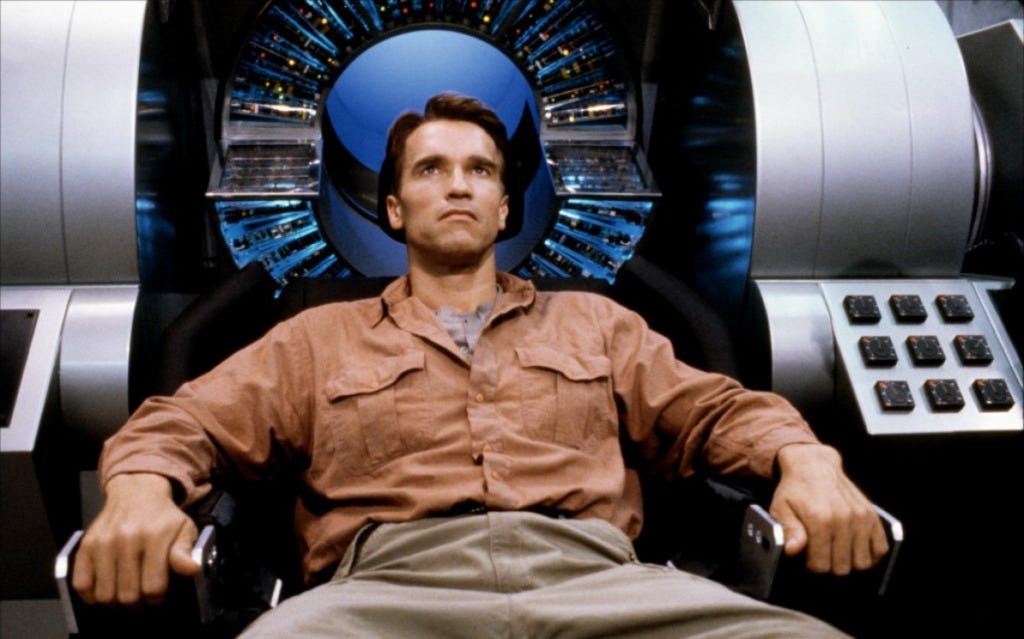Who are You Now?
Congratulations on your early retirement! Instead of dying of a coronary at your desk, you’re one of the lucky souls who will get to have a (modestly-funded) second act while still in decent health. You wake up on Monday morning with no fixed agenda and… now what?
After thirty years of 9-to-5 employment, who are you without your busy schedule? Even when the Covid pandemic hit Manhattan, you still insisted on going into the empty corporate offices each day, to keep that necessary ritual. If your identity is formed by what you do, then who are you now, without that decades-old habit? In the kitchen right now there’s just you, your coffee-and-bagel, and the fear of nihilistic extinction.
The public parks on weekdays seem to be populated mostly by society's two "non-productive" groups: wandering toddlers and aimless seniors. This cannot be your fate -- so you urgently need to craft a new daily schedule, and a brand new purpose. Desperate, you purchase trendy pop-psychology books such as Atomic Habits by James Clear, and The Power of Habit by Charles Duhigg.
Their message gives you a lifeline: habits can define us for good or ill. A cautionary case given by Duhigg concerns a well-off woman, an “empty nester,” who visited a local riverboat casino one day out of boredom. She started with a few playful bets, soon developed a compulsive habit, and within a few years had squandered her inheritance and gone bankrupt... twice.
On the positive side of the spectrum there is a Will Durant quote: "We are what we repeatedly do. Excellence is not an act but a habit." Duhigg reports on a lab study that performed MRI scans on a participant, Lisa, who had replaced smoking and other vices with healthier pursuits, including her first marathon run: “One set of neurological patterns --her old habits-- had been overridden by new patterns… As Lisa’s habits changed, so had her brain.”
Habits can literally rewire your brain and personality; perhaps this is how you can save yourself at midlife.
The idea that we can completely transform our personality by modifying the brain’s neurology has often been the subject of science-fiction literature and cinema. In the popular 1990 Hollywood movie Total Recall, Arnold Schwarzegger plays a humble (and bulky) construction worker named Quaid, who accidentally discovers that his whole identity is a fake. Quaid is actually Hauser, an undercover agent who has had fake memories implanted by neural technology. Even Quaid’s longtime “wife,” Sharon Stone, is a deep-cover imposter.
Quaid follows advice to “get your ass to Mars” and embarks on an adventure to recover his “lost” Hauser memories and personality. He discusses his quest with the wise mutant Kuato, a Yoda-like character who gives Quaid the existentialist perspective: “You are what you do. A man is defined by his actions, not his memory." Sure enough, at the climax of the movie, Quaid discovers that his original Hauser personality is a sadistic corporate-management goon. He makes the critical choice to keep the moral decency of his new Quaid existence, and to renounce the old Hauser neural identity forever.
You are likewise interested in switching identity, and dropping your obsolete past self. In Atomic Habits James Clear states: “Habits are the path to changing your identity... The way to change who you are is to change what you do.”
How to Change Identities
What if it were easy to change identity simply by swapping out neural patterns -- like downloading a new fitness app on your smartphone? A science-fiction fable using this idea is the 2009 TV series Dollhouse. The show was conceived by its star Eliza Dushku and writer Joss Whedon during a lunch discussion about the multiple “identities” that a professional actor has to constantly toggle between during the Hollywood audition process.
The premise of Dollhouse is that the giant biomedical Rossum Corporation runs a secret department, the ultimate “temp agency” for the ultra-wealthy: they offer “programmable” human operatives (Dolls) whose brains have personalities and expert skills customized to suit each client.
Eliza Dushku portrays an idealistic but violent activist (Caroline) who escapes a lifetime prison sentence by agreeing to a 5-year contract with Rossum to become one of these Doll operatives. The initial process is to have a “neural engram” snapshot of her existing memories and persona copied to a hard-drive for archive. Next, her brain is “wiped” of all memories, reducing her to the infantile tabula rasa Doll state. The old “Caroline” identity is gone, and she is given her new operative codename “Echo,” ready to be imprinted with a fresh new personality engram for her next client, whether as an expert safecracker, or romantic escort, or hostage negotiator.
Rossum has a large reference library of personality engrams available, either recorded from real people or fabricated from scratch. Because the Dolls require full-fledged personalities, the engrams come with entire life-memories and all the requisite Freudian baggage, so there is the Neurotic Chef, the Reckless Botanist, the Arrogant Detective etc. (For the TV viewer, one of the pleasures of the show is watching talented actors quickly switch between these very different personalities.)
Our own identities are just particular neural pathways, and the plasticity of the brain means that we can use habits to reprogram the software.
Educational institutions have always used this strategy, whether they are Wahhabi classrooms in Saudi Arabia, Catholic high schools in Boston, or West Point Military Academy. All these schools run years-long cognitive and behavioral drills on students to mold their respective desired personalities: as ardent jihadis, devout pro-life voters, or obediant U.S. Army officers. These are all essentially just “neural engram imprint centers” like the Dollhouse.
On a personal level, the key question is whether you can deliberately “re-program” yourself. Magazines love to do dramatic profiles of the obese father-of-four who transformed himself into a triathalon athlete, or the big-city law partner who quit her firm to run a surf shop on a small Caribbean island. Religion scholars use the term metanoia for these transformations, the classic case being the “Road To Damascus” moment when the Pharisee Saul’s identity flipped and he became the Apostle Paul. Akin to these are addiction redemption tales of the “rock bottom” realization when the addict makes the irrevocable decision to turn their life around.
Right now, can you trigger this metanoia pivot deliberately, in the absence of any lightning-flash gift of grace? All that is needed is the firm decision to drop old patterns and to begin new habits.
Making the Commitment
When movie actors get a major role, they can spend months in physical and behavioral training to “become” the desired character. “Method” actors such as Daniel Day Lewis and Sean Penn often refuse to break character for weeks, even when off-camera.
If Method actors can show extreme dedication to transforming daily behaviors for their craft, then surely you can do the same for transforming your own life. You may have been a Technology Manager yesterday, but by changing habits today you could potentially become an Athlete, Gardener, Artist, or Chef by next year.
You schedule your life with a frenzy of new Retirement Habits:
8am - Yoga / Qigong
9am - Journal Writing session
9:30am - Vocal warmup
10am - Read three poems or one essay
11am - Cardio Kickboxing
1pm - Criterion Channel World Cinema (foreign film, must be subtitled - not dubbed)
3pm - Resistance Training
etc…
Or as the song says:
And now the day is come
Soon he will be released
Glory Hallelujah!
We’re building the Perfect Beast!
(Don Henley)
And yet…
After writing the above task list, you are reminded of something similar, and look up Scott Fitzgerald’s classic novel, finding this passage in the final pages:
He opened it at the back cover and turned it around for me to see. On the last fly-leaf was printed the word SCHEDULE, and the date September 12th, 1906. And underneath:
Rise from bed . . . 6.00 A.M.
Dumbbell exercise and wall-scaling . . . 6.15-6.30
Study electricity, etc . . . 7.15-8.15
Work . . . 8.30-4.30 P.M.
Baseball and sports . . . 4.30-5.00
Practice elocution, poise and how to attain it. . . 5.00-6.00
Study needed inventions . . . 7.00-9.00
This was the daily schedule of the ambitious young man who would become “the Great Gatsby.”
You have apparently fallen into the same trap as Jay Gatsby, the tragic exemplar of the obsession with fabricating a new identity.
Sometimes the best habits can lead ultimately to your bloodied body lying face-down in the swimming-pool.
Taking the Backward Step
The Gatsby Trap is the treadmill of constant self-improvement and relentless productivity, America’s true religion.
Not every culture has elevated daily productivity as the highest individual goal. In ancient times Chinese scholar-bureaucrats would retire early from the Imperial Court, and go live in the remote mountains to meditate and become poets and landscape painters.
Wherever the mind dwells apart is itself
a distant place. Picking chrysanthemums
at my east fence, I see South Mountain
far off: air lovely at dusk, birds in flight
returning home. All this means something,
something absolute: whenever I start
to explain it, I forget words altogether.
…
Everything at rest, dusk: a bird calls,
returning to its forest home. Chanting,
I settle into my breath. Somehow, on this
east veranda, I’ve found my life again.
(T’ao Ch’ien, 5th Century C.E. translated by David Hinton)
In the Dzogchen branch of Tibetan Buddhism the emphasis is not on self-improvement, but rather on resting in the quality of awareness itself. Awareness is the “sunlit space” in which thoughts and memories appear merely as transient content. This “pristine awareness” is distinct from our manufactured personality engrams. It is the radiant blue sky, distinct from the cloud formations that appear within it.
By the end of the Dollhouse series, the supposedly “blank” Dolls have begun to behave in ways that their Rossum Corp managers never anticipated. And one of them, Echo, has developed meta-consciousness: she has evolved into a being with full access to dozens of imprinted identities, yet transcending all of them. She has become Echo Bodhisattva, aware and able to witness all her different personality engrams, but not needing to identify with any of them.
One Tiny Habit
You began your retirement anxious that without a busy new schedule you’d become just another old fogey wasting the days away on a park bench. An aimless nobody. You became obsessed with crafting a new identity by selecting new habits.
You’re aware now that this may not be possible, or even desirable.
And yet, maybe you could implement just one new tiny habit: on your calendar you have scheduled writing sessions, morning and evening, for every day.
And so you pick up your pen, and start writing: “Congratulations on your early retirement!…”
*********************




















